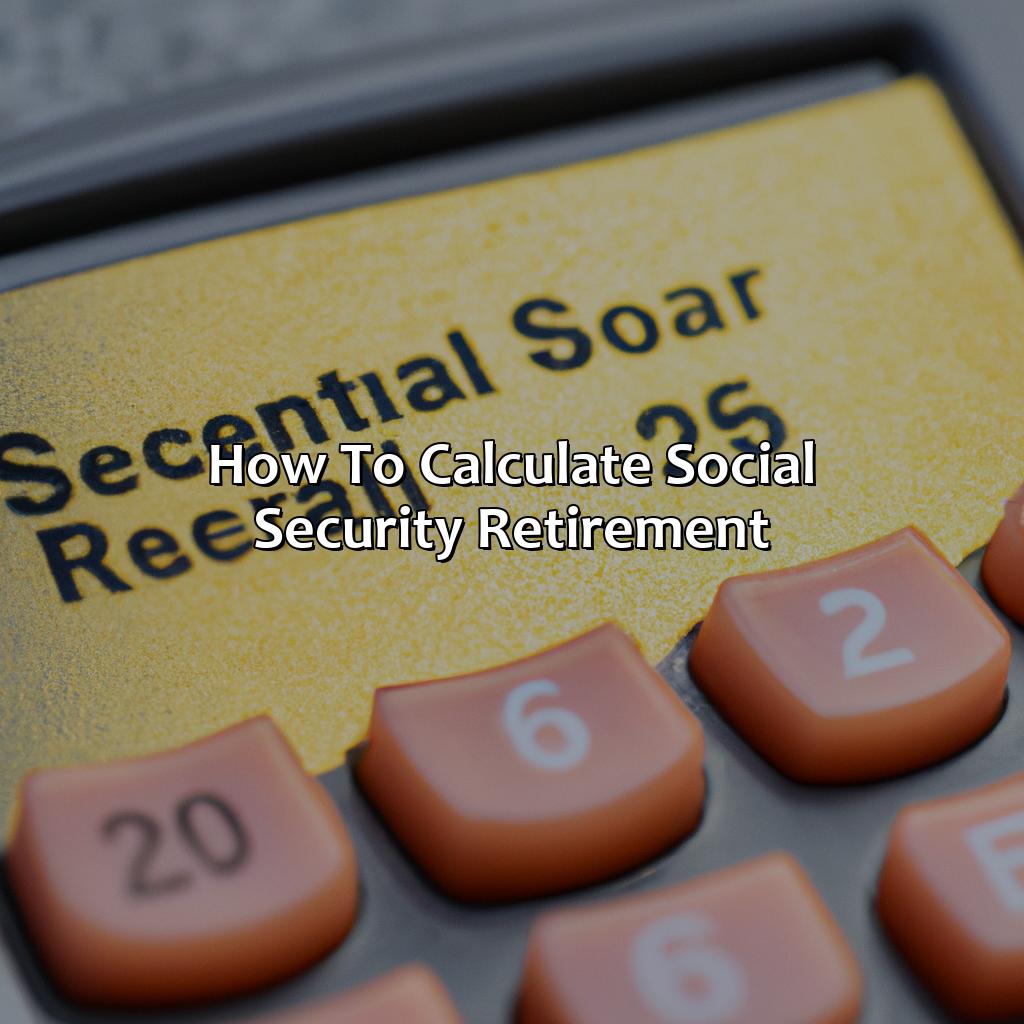How To Calculate Social Security Retirement?
Key Takeaway:
- Calculating social security retirement benefits involves determining your full retirement age and understanding the factors that affect your retirement benefits, such as early retirement reduction, delayed retirement credits, and income limits.
- Retirement benefits are calculated based on your Primary Insurance Amount (PIA), which is based on your average indexed monthly earnings. Adjustments can be made to your retirement benefits, such as reductions for early retirement or increases for delayed retirement.
- Maximizing your social security benefits can involve strategies such as delaying retirement, exploring spousal benefits, and understanding survivor benefits.
Are you worried about your retirement and how to calculate your social security benefits? You’re not alone. In this blog post, you’ll learn the simple step-by-step process to calculate your social security retirement benefits so that you can be financially prepared for your future.
Understanding Social Security Retirement Benefits
Social Security Retirement Benefits can be calculated based on various factors, including age and earnings history. By understanding the eligibility criteria, applicants can determine their benefit amount. Additionally, once retired, beneficiaries can opt to receive benefits as early as age 62 or wait until full retirement age to receive a higher benefit amount. To get the most out of Social Security Retirement Benefits, it is crucial to plan ahead and consider the long-term impact of various claiming strategies.
It’s important to note that Social Security Retirement Benefits also provide spousal and survivor benefits to eligible spouses and dependents. These benefits are based on the earnings history of the primary beneficiary and can provide additional financial support to eligible family members.
Pro Tip: Consider consulting with a financial advisor or Social Security specialist to determine the best claiming strategy for your specific situation. By maximizing your Social Security Retirement Benefits, you can ensure a more comfortable retirement.

Image credits: retiregenz.com by Yuval Jones
Determine Your Full Retirement Age
Unlock the answer to your full retirement age! This section has all the info you need. Investigate the calculation to fully comprehend how Social Security Retirement works and how to plan for your future. Get ready for retirement now!

Image credits: retiregenz.com by Adam Arnold
Calculation for Full Retirement Age
The retirement age is calculated using specific formulas that rely on many factors. The formula for calculating the “Full Retirement Age” considers your birth year to determine eligibility for full social security benefits.
| Birth Year | Full Retirement Age |
|---|---|
| 1937 or earlier | 65 years old |
| 1938-1942 | Add 2 more months for every year after 1937 (e.g., if born in 1940, full retirement age would be age 65 + (3 x 2) = age 71) |
| 1943-1954 | 66 years old |
It’s essential to understand how and when you can qualify for social security benefits, as it provides critical income during retirement. Factors such as early retirement or delayed retirement affect the amount of benefits you receive.
While calculating the full retirement age gives a good indication of how much social security can provide during active years – one also needs to consider other interests and investments per need to have an adequate savings plan in place before leaving active work status.
Ready, set, calculate! It’s time to figure out just how much money you’ll be raking in during your hard-earned retirement years.
Calculate Your Retirement Benefits
Calculate your retirement benefits using the Primary Insurance Amount (PIA) formula. Refer to this section. There are sub-sections on adjustments and the PIA formula. Solutions help you determine social security benefits accurately and quickly.

Image credits: retiregenz.com by David Duncun
Primary Insurance Amount (PIA) Formula
The computation to determine the amount of Social Security retirement benefits you may receive is called the formula for your Primary Insurance Amount (PIA). The PIA formula considers your income and the number of years you’ve paid Social Security taxes.
- Step 1 – Determine your average indexed monthly earnings.
- Step 2 – Determine the “bend points” – values that divide the earnings spectrum into three portions that have different benefit formulas.
- Step 3 – Calculate your dot product with the PIA formula to obtain a preliminary PIA.
- Step 4 – A cost-of-living adjustment (COLA) is applied for each year to bring the computation up-to-date by calculating it backward from age 62. This results in a final Primary Insurance Amount (PIA) that sets the benefit level for you at full retirement age.
It’s essential to note that these values change each year, as there are COLA and national wage index updates. Other factors might also affect your benefit amount. Suppose you work past full retirement age or earn significant income while receiving early benefits. In that case, there may be reductions or additional credits on your benefit.
Don’t let yourself rule out an important factor in planning for retirement when calculating Social Security benefits, even if you have other sources of income. You might miss out on valuable future financial options by not ensuring that Social Security is part of your overall retirement strategy.
“Adjustments to retirement benefits? Sounds like a euphemism for ‘we’re taking away some of your money, but we’ll call it something fancy.”
Adjustments to Retirement Benefits
As you plan for retirement, it is important to understand the adjustments that can affect your benefits. These adjustments take into account factors such as age, inflation, and income changes. Understanding these adjustments will allow you to accurately calculate your retirement benefits.
One critical adjustment that can impact your benefits is related to early or late retirement. If you retire before full retirement age, your monthly benefit amount will be reduced, while delaying retirement beyond full retirement age will increase your benefit amount each year until maximum age 70.
Other adjustments include cost-of-living increases and income-related adjustments such as adjusted gross income limits and earnings test limits. It’s also important to note that certain beneficiaries may face reductions or suspensions of their Social Security benefits due to work pensions or other retirement income streams.
It’s essential to have a comprehensive understanding of how these various adjustments apply to your specific situation. Speaking with a financial advisor or reviewing Social Security documentation in detail can provide valuable insight.
One example of the importance of understanding these adjustments is the case of John. He didn’t realize that his earnings from a part-time job as a consultant would impact his Social Security benefits based on the earnings test limit adjustment. This led him to receive less than he anticipated during his first year of retirement until he adjusted his employment situation accordingly.
Retirement benefits: where the amount you receive is inversely proportional to the number of grey hairs you have trying to figure out the calculations.
Factors That Affect Retirement Benefits
Knowledge of factors that affect retirement benefits is essential for successful retirement planning. Let’s explore these factors! This section is called “Factors That Affect Retirement Benefits” and includes Early Retirement Reduction, Delayed Retirement Credits, and Income Limits. These sub-sections will give you a comprehensive understanding of the factors.

Image credits: retiregenz.com by Yuval Duncun
Early Retirement Reduction
Reducing Social Security Benefits by Retiring Early
Retiring early affects the amount of social security retirement benefits a person receives. Early retirees receive less income because they collect it for a more extended period. If someone chooses to retire before their full retirement age, their benefits reduce by five-ninths of one percent per month. That percentage equals six and two-thirds percent per year. However, there’s a catch when receiving early retirement benefits. If someone works while receiving early Social Security benefits, they may forfeit some of their income.
Research shows that every third American aged 65 or over relies solely on social security payments in 2021. According to the Center on Budget and Policy Priorities (CBPP), if no Social Security reforms are implemented soon, beneficiaries may experience up to a 23% cut in their payout by 2035 due to depleted trust funds.
If you’re willing to work a bit longer, delayed retirement credits can turn you from a silver fox into a wealthy wolf.
Delayed Retirement Credits
As we grow older, retirement benefits become an important factor to consider for our future. One of the elements that can affect such benefits is known as Delayed Earnings Credits. It is simply a way to increase your retirement payment by delaying your benefits.
When we decide to delay our social security retirement, we are in fact postponing the collection of our benefits beyond our full retirement age. For those born after 1943, there is a possibility of accruing more credits for every month they choose to delay their earnings, which can ultimately increase their retirement benefit up to 8% per year.
It may seem insignificant at first glance, but these credits can add up over time and generate additional income for your later years. It’s also essential to note that these credits stop accumulating once you reach the age of 70.
To secure better financial stability in your golden years, it is crucial to start planning early and make informed decisions about your retirement finances. Don’t miss out on potentially higher benefits by not taking advantage of Delayed Retirement Credits.
Consult with an experienced financial advisor or Social Security planner and weigh your options before finalizing any decisions related to your future retirement plans.
Retirement planning tip: If your income limit is too high for social security benefits, just tell them you’re a freelance cloud watcher.
Income Limits
Earning Thresholds- Social Security Retirement Eligibility Requirements
To receive social security retirement benefits, one must be fully insured by earning enough credits through paid work. The maximum amount that can be earned each year to receive credits is known as the ‘earning threshold’. In 2021, one receives a credit for every $1410 in earnings and a maximum of four credits per year.
The amount of income received while receiving social security retirement benefits also affects the payment amounts. If an individual earns more than the allowable limit, their benefits will decrease. This amount varies depending on their age.
However, it’s important to note that if an individual continues working after the full retirement age (FRA), which is currently 67 years old for those born in or after 1960, then there are no earning limit restrictions upon receiving social security retirement benefits.
According to Motley Fool, “almost half of all single elderly beneficiaries rely on Social Security for at least 90% of their income.”
Stop playing Russian roulette with your retirement benefits and start maximizing your social security benefits instead.
Maximizing Your Social Security Benefits
Maximize your Social Security benefits? Yes, you can do it! Learn the strategies. This section covers them. Delayed Retirement Strategy, Spousal Benefits, and Survivor Benefits. Understand them. Make informed decisions. Get ready for retirement.

Image credits: retiregenz.com by Harry Arnold
Delayed Retirement Strategy
Postponed Retirement Concept:
Delaying your retirement is an outstanding approach to increase your social security benefits. When you opt to hold off on receiving benefits after reaching the age of 62 until the age of 70, you are encouraged to take advantage of this plan. This approach can result in a boost in monthly benefits.
In contrast to taking advantage of these benefits at an early age, delaying will have significant financial implications. While receiving early payments can be beneficial in meeting expenses, waiting can lead up to a 32 percent increase in monthly benefits. Also, additional credits for continuing to work beyond retirement age may be earned.
Pertinent Details:
Delaying social security payments should not be taken lightly; a person’s personal circumstances must be considered before opting for this choice. For instance, delayed awards could benefit those who are employed or exhibit good health levels because they would have no reason or necessity for compensation beforehand.
True Story:
“Mark has elected to delay his retirement eligibility under Social Security administration from age 62 until he reached age 75 and above. Since retiring at the customary era would end him with minimal payments alongside scarce funding options, Mark chose the latter than ever wanting more considerable rewards in later years.”
Marriage may have its downsides, but spousal benefits from Social Security definitely aren’t one of them.
Spousal Benefits
One often overlooked aspect of retirement planning is spousal benefits, which can provide valuable additional income for couples. Social security offers spousal benefits based on your spouse’s work history, which can be up to half of their own benefit amount. To qualify, the marriage must have lasted at least 10 years and the spouse must be at least 62 years old.
It’s important to note that claiming spousal benefits early can reduce both your own benefit amount and your spouse’s. Additionally, if a couple is divorced but was married for at least 10 years, the ex-spouse may still qualify for spousal benefits. Understanding these rules and maximizing eligibility can greatly increase a couple’s overall social security benefit.
Don’t miss out on potential spousal benefits – take the time to understand your eligibility and carefully plan your retirement strategy with a financial advisor. It could make a significant impact on your financial future as a couple.
Your ex may have left you, but don’t worry, Social Security will always give you some love with survivor benefits.
Survivor Benefits
- These benefits are calculated based on the deceased individual’s earnings record
- The surviving spouse can receive up to 100% of the deceased individual’s benefit, after reaching full retirement age
- Children and dependent parents may also be eligible for benefits
It’s important to note that Survivor Benefits cannot be claimed until the individual has passed away. Make sure you understand your rights and eligibility for these benefits to ensure financial security for your loved ones in case of your unfortunate demise.
If only applying for a boyfriend was as easy as applying for social security benefits.
Apply for Social Security Retirement Benefits
To get Social Security retirement benefits, you need to know the process. Eligibility requirements and an application process are needed. We will discuss this procedure. Then you can receive your benefits!

Image credits: retiregenz.com by Adam Jones
Eligibility Requirements
To apply for social security retirement benefits, certain criteria must be met. These prerequisites vary depending on factors such as age and work history. Age is a key factor in determining eligibility. One can begin collecting these benefits at age 62; however, full retirement benefits are only achievable once the applicant reaches their full retirement age, determined by birth year.
Additionally, accumulating the necessary credits throughout one’s career is vital to receiving these benefits. The Social Security Administration calculates an applicant’s credits based on their earnings record. Someone who has worked more years and earned higher wages will accumulate more credits compared to someone with less work history or lower wages.
It is important to note that there are other significant requirements an individual may have to meet, such as citizenship status and disability status.
The National Academy of Social Insurance reports that the majority of elderly beneficiaries rely heavily on Social Security payments as their primary source of income in retirement.
Getting older is like filling out a job application, except this time you’re applying for retirement benefits and your only qualification is that you’ve managed to survive this long.
Application Process
To start applying for retirement benefits from the Social Security Administration, you must complete the process of submitting an application. This involves providing necessary information about yourself such as your birth date, Social Security number, and any spouse’s or ex-spouse’s details if applicable.
After submitting the application, the SSA calculates your benefit amount based on your earnings record. They use a formula that considers your top 35 years of earnings, indexing these historical income figures and adjusting them for inflation in order to arrive at a more accurate calculation. It’s important to note that you can receive higher benefits by delaying your retirement.
Furthermore, it’s recommended that you apply online through the SSA’s website or schedule an appointment with their representatives at a local office to complete the process in person. If applying online, you should create an account and provide the relevant documents before submitting them digitally.
One recent retiree shared her experience of applying for and receiving Social Security retirement benefits. She advised others to start researching options early on and regularly check Social Security statements for accuracy in order to avoid potential mistakes that could impact their future finances.
Five Facts About Calculating Social Security Retirement:
- ✅ Social Security retirement benefits are calculated based on your highest 35 years of earnings. (Source: SSA.gov)
- ✅ The earliest age to start receiving Social Security retirement benefits is 62. (Source: SSA.gov)
- ✅ Waiting to claim Social Security retirement benefits until full retirement age, which varies based on birth year, can result in a higher monthly benefit amount. (Source: SSA.gov)
- ✅ Delaying Social Security retirement benefits beyond full retirement age can result in an even higher monthly benefit amount, up to age 70. (Source: SSA.gov)
- ✅ Social Security retirement benefits are taxable if your income exceeds certain thresholds. (Source: IRS.gov)
FAQs about How To Calculate Social Security Retirement?
How do I calculate my social security retirement benefits?
To calculate your social security retirement benefits, you can visit the official Social Security website and use the Retirement Estimator tool. You’ll need to input your personal information, including your birth date, earnings history, and planned retirement age.
What factors impact how much I will receive in social security retirement benefits?
The amount of your social security retirement benefits will depend on various factors, including your earnings history, the age at which you choose to retire, and the amount of time you’ve worked. Your benefit amount will be based on your average indexed monthly earnings, or AIME, which is calculated based on your top 35 years of earnings.
What is the full retirement age for social security benefits?
The full retirement age for social security benefits varies based on the year in which you were born. For those born between 1943 and 1954, the full retirement age is 66. For those born after 1954, the full retirement age gradually increases until it reaches age 67 for those born in 1960 or later.
Can I receive social security retirement benefits if I continue to work?
Yes, you can continue to work and receive social security retirement benefits at the same time. However, if you haven’t reached full retirement age, your benefits may be reduced if you earn above a certain limit. Once you reach full retirement age, there is no limit on the amount you can earn while receiving benefits.
How can I increase my social security retirement benefits?
You can increase your social security retirement benefits by delaying your retirement age. For each year you delay receiving benefits, your benefit amount will increase by a certain percentage, up to age 70. Additionally, continuing to work and earning a higher income can also increase your benefits.
Is social security retirement benefits taxable?
Yes, depending on your income level, social security retirement benefits may be subject to federal income tax. If your combined income, which includes your adjusted gross income and any tax-exempt interest, is above a certain threshold, a portion of your benefits may be taxable.




